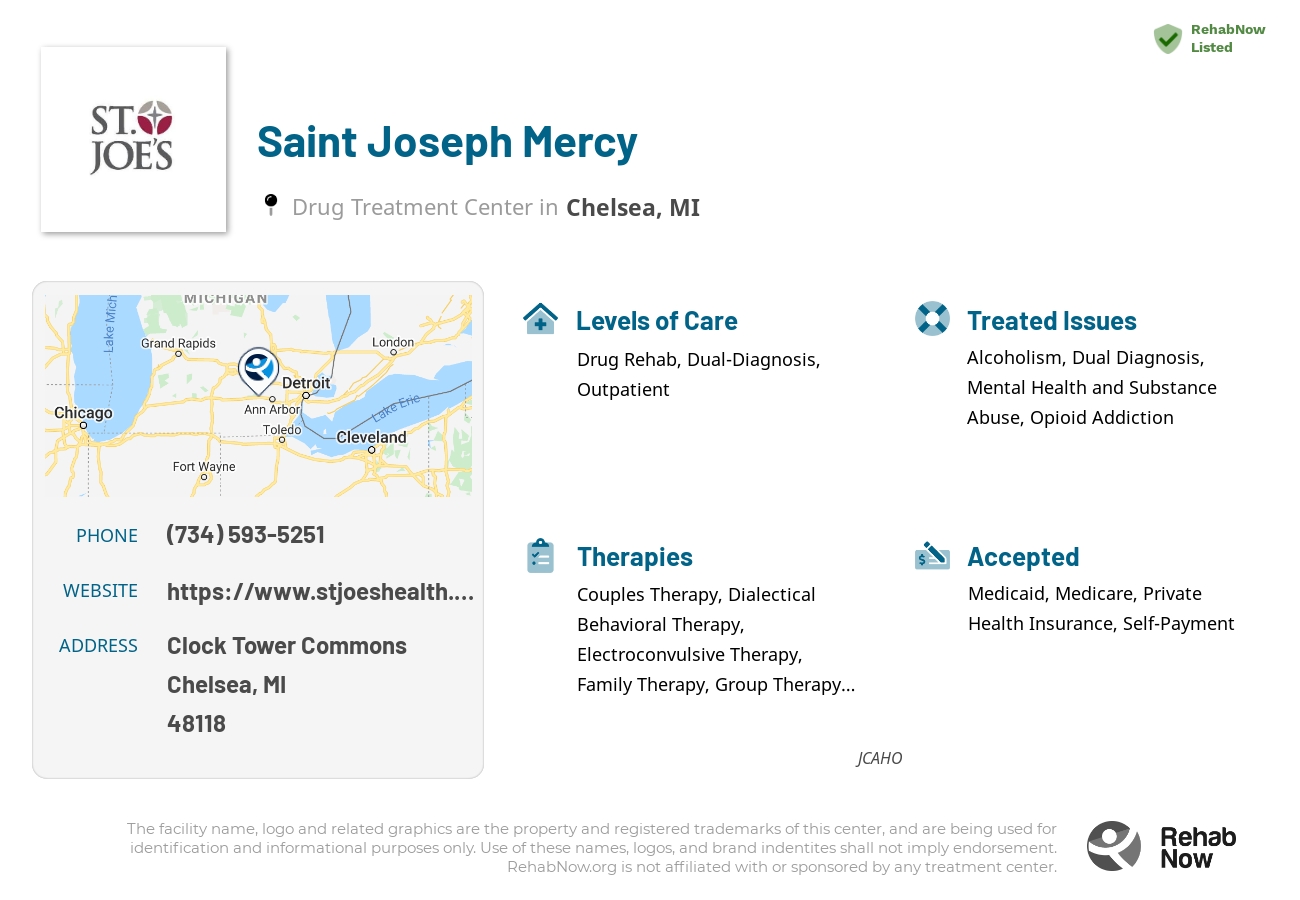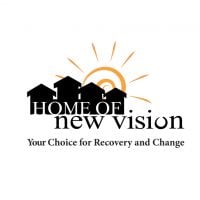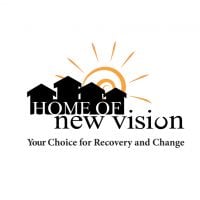Saint Joseph Mercy
Drug Rehab Center in Chelsea, Michigan
Saint Joseph Mercy in Chelsea, Michigan offers a faith-based, holistic approach to treating substance use disorders through a multidisciplinary team of healthcare professionals and evidence-based interventions, as well as additional services such as life skills training, mindfulness activities, nutritional counseling, and therapeutic activities like art and music therapy.
About This Michigan Facility
Saint Joseph Mercy in Chelsea, Michigan is part of a faith-based healthcare network that emphasizes holistic care. They offer a wide selection of treatments and services through their Inpatient and Partial Hospitalization Programs, and are committed to working with each individual to provide evidence-based interventions and support. As part of this commitment, they provide an array of therapeutic programs designed to treat substance use disorders, including interventions that focus on the physical, mental, and spiritual aspects of recovery. Their comprehensive care model includes individual and group counseling, educational sessions, family therapy, and other services tailored to each client's unique needs.
At Saint Joseph Mercy, the treatment of addiction and substance abuse is provided by a multidisciplinary team of healthcare professionals, including addiction counselors, psychiatrists, and nurses. Through these professionals, their clients receive evidence-based treatments such as cognitive-behavioral therapy, dialectical behavior therapy, psychotropic medications, and relapse prevention. Other services include life skills training, mindfulness activities, nutritional counseling, and the use of therapeutic activities like art and music therapy.
Saint Joseph Mercy is accredited by The Joint Commission and is licensed by the Michigan Department of Health and Human Services. They have also been recognized for their commitment to excellence in healthcare, receiving both the Healthgrades Patient Safety Excellence Award and the 2018 Press Ganey Summit Award. They also offer a unique Mindfulness-Based Stress Reduction (MBSR) program for those suffering from addiction, which combines mindfulness meditation, yoga, and other relaxation techniques to help individuals better cope with the difficulties of addiction recovery.
Genders
Ages
Modality
Additional
Accreditations

JCAHO
Conditions and Issues Treated
Opioid abuse has become a national epidemic in the last decade. The US has one of the world’s highest rates of opioid use and abuse, as well as opioid-related deaths. Opioids are classified as Schedule II-IV controlled substances in the US due to their high potential for abuse.
Oxycodone, hydrocodone, methadone, and fentanyl are the most common Opioids and are commonly prescribed to treat pain. Tolerance to opioids develops over time, making life difficult, if not impossible, without them. Opioid users often obtain the drugs illegally. They can be drug dealers, friends, or family members who do not have valid prescriptions.
The desire for a more intense high than prescription opioids can quickly lead to heroin use. Heroin users are more prone to illness and death due to the high risk of overdose.
Many opioid addicts who seek treatment believe that the only way to overcome their addiction is through medical detox and long-term drug addiction rehab. To help patients wean off their addiction and reduce the risk of overdose, medication-assisted therapy (MAT) involves prescribing a replacement opioid. Doctors use MAT in conjunction with other anti-craving medications to help patients maintain recovery. Due to the high risk of relapse, MAT is often combined with individual and group counseling and social support programs.
When addiction and psychiatric issues co-occur, the addict’s recovery is more successful when both conditions are treated. A dual diagnosis refers to a condition in which the patient is diagnosed with two health issues: addiction and bipolar disorder. The most common therapies are psychotherapy, behavioral therapy, spiritual counseling, 12-step programs, and medication management.
Levels of Care Offered at Saint Joseph Mercy
This center offers a variety of custom treatment tailored to individual recovery. Currently available are Drug Rehab, Dual-Diagnosis, Outpatient, with additional therapies available as listed below.
An outpatient treatment program is set up to help with alcohol or drug addiction or a co-occurring disorder. The patient must attend the facility for their therapy and other programs but can return home each night.
The frequency of mandatory attendance decreases after much of Saint Joseph Mercy‘s program is complete.
Outpatient treatment is a recovery approach that allows recovering addicts to live at home while getting rehab for addiction
An outpatient can include day treatments which include attending group sessions one hour per week. A person living in an outpatient environment may be allowed the opportunity to work full time if they choose to and continue studies without interruption from drugs/alcohol.
Outpatient treatment is an option for people who want to maintain their careers and families. Outpatients live at home but attend treatment such as individual counseling, group counseling, or twelve-step meetings during the day.
Therapies & Programs
At Saint Joseph Mercy , to learn from past mistakes and improve one’s situation, the recovering person meets individually with a therapist. The counselor or therapist will address addiction causes, triggers, mental issues, dual diagnosis, and aftercare plans during this time. This is a very intense and challenging process. Some clients find it easier to open up to someone other than family or friends who understand their struggles with addiction.
Couples therapy sessions are typically used to help couples in recovery from drug addiction work through their issues. These types of sessions can be beneficial for many reasons, including the fact that they add a layer of accountability when both partners in a couple are recovering from addiction.
Therapy can also provide addicts with another effective way to cope with stress and avoid relapse during difficult situations. This type of therapy can help improve communication with their partners, which can strengthen the relationship and prevent future problems that might lead to relapse.
Family therapy is a crucial part of drug treatment and getting sober. It is one of the most effective ways to help addicts stay on the path to long-term sobriety. An addict’s family can play a vital part in helping them to avoid relapse. They can spot the warning signs and help them get back on track.
In group therapy, recovering addicts meet with a therapist and other people in recovery. Some groups are closed, meaning only people who share the same addiction or problem can attend. Others are open to anyone who wants to stop using drugs or drinking alcohol. Group therapy sessions typically focus on one topic each week or month so that recovering addicts can discuss issues they face daily.
Trauma therapy allows people to face and learn from past traumas.
Many people suffer childhood traumas that lead to adult addiction. During treatment at Saint Joseph Mercy [/type], you can move forward in your recovery and reclaim your sober future! Trauma is a common cause of psychological disorders like Addiction Disorder. It’s common in Addictive Disorders patients because traumatized people have strong emotions or thoughts that lead to addictive behaviors.
Dialectical Behavior Therapy (DBT) is a type of therapy created in the late 1980s and early 1990s. It was designed to help people with high rates of suicidal behavior.
The goal of DBT is to teach mindfulness, distress tolerance, emotion regulation, and interpersonal effectiveness to help people learn how to live a life that is no longer controlled by overwhelming emotions and urges.
DBT is beneficial in treating drug addiction because it helps patients understand and cope with their cravings for drugs or alcohol rather than turning to those substances as a way of coping.
Cognitive Behavioral Therapy (CBT) is based on the idea that how we feel, think and act all interact together. It helps people explore their thoughts for problems (or false beliefs) that influence their mood and actions. CBT is very goal-oriented, which means that the therapist and patient work together on a specific problem. In addition to helping a client focus on thoughts that can be changed, CBT also allows them to take an active role in their treatment. Our thoughts determine our feelings and behaviors; our feelings affect our thoughts, and our behaviors change our thoughts and feelings.
Payment Options Accepted
For specific insurance or payment methods please contact us.
Is your insurance accepted?
Ask an expert, call (888) 674-0062
Saint Joseph Mercy Associated Centers
Discover treatment facilities under the same provider.
- Saint Joseph Mercy Adolescent Partial Hospitalization in Ann Arbor, MI
- Saint Mary Mercy Hospital - Behavioral Health Unit in Livonia, MI
- Saint Mary Mercy Hospital - Department of Behavioral Medicine in Livonia, MI
- Saint Joseph Mercy Health System - Behavioral Health in Ann Arbor, MI
- Saint Mary Mercy Hospital Dept of Behavioral Medicine in Livonia, MI
Learn More About Saint Joseph Mercy Centers
Additional Details
Specifics, location, and helpful extra information.
Chelsea, Michigan 48118 Phone Number(734) 593-5251 Meta DetailsUpdated November 25, 2023
Staff Verified
Patient Reviews
There are no reviews yet. Be the first one to write one.
Chelsea, Michigan Addiction Information
Michigan has the second-highest rate of drug and alcohol abuse in the nation. Heroin is linked to more than 50% of the state's hepatitis C cases. Marijuana is the drug most often associated with crimes in Michigan, followed by methamphetamines. Opioids alone are responsible for almost 20% of all drug overdose deaths in Michigan.
The drug addiction problem in Chelsea, Michigan is relatively severe. According to recent statistics, approximately 2,000 people in Chelsea struggle with drug addiction. Drug abuse has been linked to many social problems in the area, including crime, violence, and unemployment. In 2016, there were 1,521 overdose deaths. The types of treatment available in Chelsea, Michigan, include inpatient rehabilitation, outpatient rehabilitation, and 12-step programs.
Treatment in Nearby Cities
- Benzonia, MI (190.3 mi.)
- Grand Blanc, MI (46.5 mi.)
- Mio, MI (161.4 mi.)
- Capac, MI (73.1 mi.)
- Fulton, MI (69.8 mi.)
Centers near Saint Joseph Mercy
The facility name, logo and brand are the property and registered trademarks of Saint Joseph Mercy, and are being used for identification and informational purposes only. Use of these names, logos and brands shall not imply endorsement. RehabNow.org is not affiliated with or sponsored by Saint Joseph Mercy.












